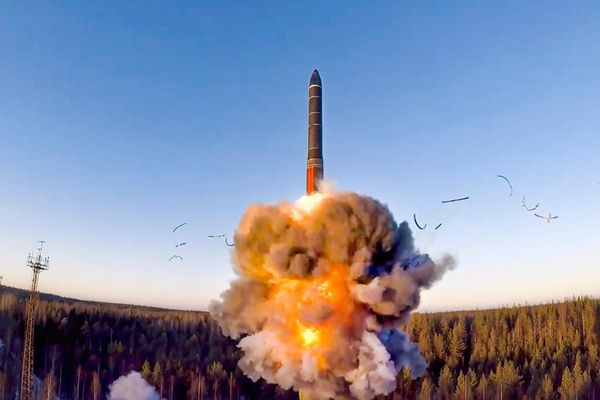
David McBride has declared “today I serve my country” as he entered an ACT court to face trial for the alleged leaking of material later used to expose Australian war crimes in Afghanistan.
McBride faces five charges, including the unauthorised disclosure of information, breaches of the Defence Act and the theft of commonwealth property. His trial started on Monday in the ACT supreme court.
The former military lawyer, who is represented by leading criminal law barrister Stephen Odgers SC, has pleaded not guilty.
Supporters gathered in front of the court on Monday to hear speeches from the Human Rights Law Centre senior lawyer Kieran Pender, Julian Assange’s Australian lawyer Stephen Kenny and the Medical Association for Prevention of War’s Sue Wareham, among others.
McBride spoke briefly to the crowd as he entered the court with his support dog, Jakey, who will stay beside him during the proceedings.
“Today I serve my country,” he said. “The question I have for you, Anthony Albanese, is who do you serve?”
McBride allegedly leaked material to the ABC about the investigation of Australian special forces operating in Afghanistan.
ABC reporters later used the documents as the basis of a 2017 series on Australian war crimes titled The Afghan Files.
The court on Monday was dealing with preliminary legal issues before a jury was to be empanelled later this week.
The preliminary arguments related to whether McBride had a duty not to disclose the material.
Commonwealth prosecutors, led by Trish McDonald SC, argue McBride’s role within the Australian Defence Force, and the military disciplinary system he was operating within, imposed a duty on him not to disclose the material.
McBride’s defence says he had a separate duty to act in the public interest and that the military disciplinary regime – and any duty it imposed on McBride not to disclose such material – could only be considered by military tribunals, not by courts of criminal law.
“If the jury is satisfied that what was done was in the public interest, even though it was in breach of orders, then, in my respectful submission, you’re not in breach of your duty for the purposes of a criminal offence,” Odgers said.
Odgers said disclosures in such circumstances would still be punished in the separate jurisdiction of the military courts, even where they were made in the public interest.
He also argued that McBride, as a legal practitioner, had a separate duty to protect the administration of justice and disclose information about criminality, which overrode his duty to comply with military orders.
It heard on Monday morning that the commonwealth was seeking to intervene via the National Security Information Act – a law that can be used to suppress parts of the evidence and restrict the handling of sensitive information.
The commonwealth will also make a public interest immunity claim over some of the evidence due to be heard during the proceedings. The issues around suppression and secrecy will be heard on Wednesday, the court heard.
Justice David Mossop is presiding over the trial.







